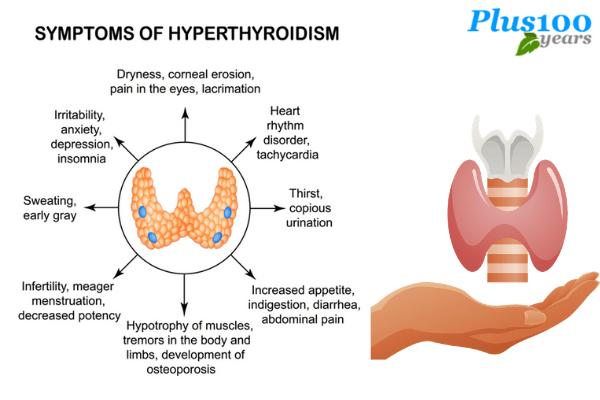know the latest hyperthyroidism symptoms, causes, tests, and treatments.
Hyperthyroidism is a condition of the thyroid when it produces too much of either tetraiodothyronine (T4), triiodothyronine (T3) hormones, or both in the body.
Early diagnosis of this overactive thyroid condition and proper treatment can relieve the symptoms and prevent any long-term complications.
ELISA immunoassay is a widely prescribed test for evaluating the TSH value in the body. However, this TSH test doesn’t explain the cause of too low or high levels of TSH.
Causes of Hyperthyroidism
A myriad of medical conditions can lead to Hyperthyroidism. An autoimmune disorder, Graves disease is the common reason for unexplained low TSH levels.
Graves’s disease is way more common in women than in men. It tends to run in families; therefore, there is a genetic link.
You must consult your doctor if anyone in your blood relation has/has the graves disease to know your risk factor.
Here Are Some Other Causes of Hyperthyroidism
-
Excession iodine in the body, which is a crucial ingredient in T3 and T4.
-
An excessive amount of tetraiodothyronine through dietary supplements or medicines.
-
Tumor of testes or ovaries.
-
Inflammation of the thyroid gland.
We must know some common and uncommon Hyperthyroidism Symptoms checklist
Hyperthyroidism Symptoms Checklist
Now, coming to the symptoms of this thyroid condition. High amounts of T3, T4, or both in the body often contribute to an aggressive metabolic rate that leads to weight loss.
You may also experience rapid heartbeat, elevated blood pressure, and sometimes hand tremors.
Some even sweat more than usual, and with time develop a low tolerance for heat.
In women, increased TSH levels cause irregular menstrual cycles.
Are there any visible symptoms? Yes, the thyroid gland itself swells to form a goiter, which can be symmetrical or one-sided.
Your eyes may become more prominent than ever. It is a sign of exophthalmos, which is related to graves’ disease.

Some Prevalent Symptoms of Hyperthyroidism:
-
Sleep difficulty.
-
Weakness
-
Inability to concentrate.
-
Nausea
-
Breast development in men
-
Brittle hair
The Following Are the Symptoms That Require Immediate Medical Attention:-
-
Shortness of breath.
-
Dizziness
-
Irregular heart rate.
-
Loss of consciousness.
Hyperthyroidism Treatment
Medications
Firstly, your doctor may prescribe certain medicines such as methimazole to prevent the thyroid gland from producing excessive hormones.
In most cases, Hyperthyroidism can be controlled with proper medication.
Your doctor may advise you to take the ELISA TSH test every 15 days to monitor the hyperthyroidism treatment with medicines.
Radioactive Iodine
If the medicines are unable to control the hyperthyroidism condition, your doctor may recommend radioactive iodine to destroy all the cells that are responsible for the excessive production of TSH in the body.
There are certain side effects experienced by some patients, such as dry mouth & eyes, sore throat, and even temporary loss of taste.
Surgery
The worst-case scenario is when the doctor recommends you to undergo the knife to surgically remove a section or the entire thyroid gland.
After surgery, the doctor will prescribe supplements to prevent another thyroid condition known as hypothyroidism, which occurs when the levels of TSH are too low in the body.
Most people are cured permanently after the surgery.
What Can You Do to Naturally Control Hyperthyroidism?
Eat a well-balanced diet, with a focus on sodium and calcium. Work with your doctor to create a health guideline for your diet, excessive, and nutritional supplements.
Final Thoughts
Hyperthyroidism symptoms checklist is given a clear idea about common and uncommon symptoms, The long-term outlook of this thyroid condition majorly depends on its cause.
If it’s related to stress or infection, then Hyperthyroidism can be controlled quickly.
But, if it is because of any medical condition like Graves’ disease, your hyperthyroidism condition can worsen without proper treatment.
Finally, early diagnosis is of paramount importance to get quick relief from the symptoms and effectively treat the hyperthyroidism condition.

